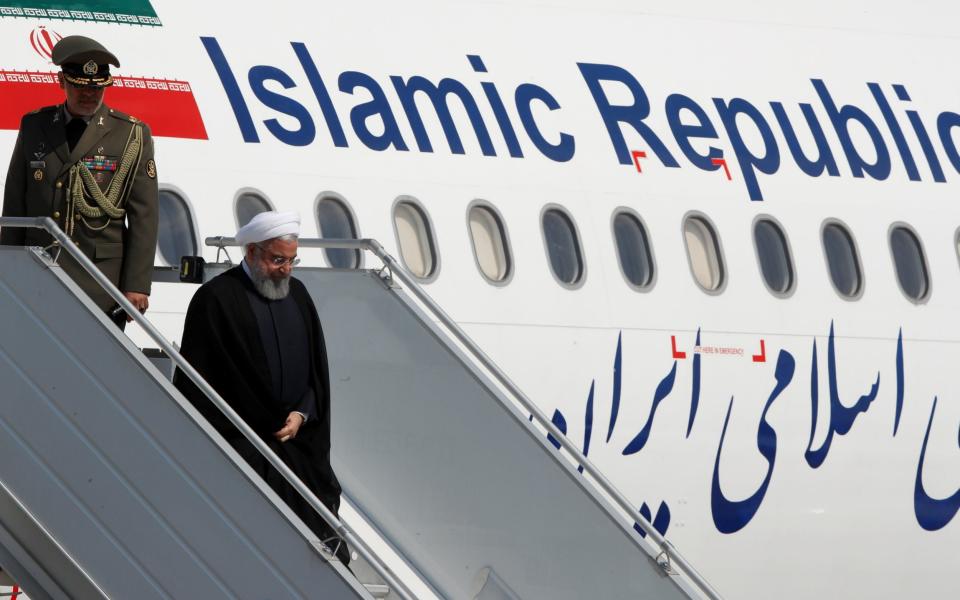US launches campaign to pile pressure on Iranian leaders

The Trump administration has launched an offensive of speeches and online communications meant to foment unrest and help pressure Iran to end its nuclear program and its support of militant groups, according to US officials familiar with the matter.
More than half a dozen current and former officials said the campaign, supported by Secretary of State Mike Pompeo and national security adviser John Bolton, is meant to work in concert with President Donald Trump's push to throttle Iran's economy by re-imposing tough sanctions.
The drive has intensified since Mr Trump withdrew on May 8 from a 2015 seven-nation deal to stop Iran from developing nuclear weapons.
The current and former officials said the campaign painted Iranian leaders in a harsh light, at times using information that is exaggerated or contradicts other official pronouncements, including comments by previous administrations.
The White House declined comment on the campaign. The State Department also declined to comment on the campaign specifically, including on Mr Pompeo's role.
A senior Iranian official dismissed the campaign, saying the United States had sought in vain to undermine the government since the 1979 Islamic Revolution. He spoke on condition of anonymity.
"Their efforts will fail again," the official said.
A review of the State Department's Farsi-language Twitter account and its ShareAmerica website - which describes itself as a platform to spark debate on democracy and other issues - shows a number of posts critical of Tehran over the last month.

Iran is the subject of four of the top five items on the website's "Countering Violent Extremism" section. They include headlines such as "This Iranian airline helps spread violence and terror."
In social media posts and speeches, Mr Pompeo himself also appeals directly to Iranians, the Iranian diaspora and a global audience.
On June 21, Mr Pompeo tweeted out graphics headlined: "Protests in Iran are growing," "Iranian people deserve respect for their human rights," and "Iran's revolutionary guard gets rich while Iranian families struggle." The tweets were translated into Farsi and posted on the ShareAmerica website.
#Iran’s corrupt regime has enriched
#IRGC, #Hizballah and #Hamas, and plundered the country’s wealth on proxy wars abroad while Iranian families struggle. pic.twitter.com/3ivRyrIQ53— Secretary Pompeo (@SecPompeo) 21 June 2018
On Sunday, Mr Pompeo will give a speech titled "Supporting Iranian Voices" in California and meet Iranian Americans, many of whom fled the Islamic Revolution that toppled Shah Mohammad Reza Pahlavi.
"Let me be clear, we are not seeking regime change. We are seeking changes in the Iranian government's behaviour," a State Department official said in response to questions from Reuters.
"We know we are driving Iran to make some hard choices. Either they can change their ways or find it increasingly difficult to engage in their malign activities," said the official, speaking on condition of anonymity. "And we believe we are offering a very positive vision for what we could achieve and what the Iranian people could have."

Some of the information the administration has disseminated is incomplete or distorted, the current and former officials said.
In a May 21 speech in Washington, Mr Pompeo said Iranian leaders refused to spend on their people funds freed by the nuclear weapons deal, using it instead for proxy wars and corruption.
By contrast, in March testimony before a US Senate committee, the US Defence Intelligence Agency director, Robert Ashley, said social and economic expenditures remained Tehran's near-term priority despite some spending on security forces.

Mr Pompeo also accused "Iran-sponsored Shia militia groups and terrorists" of infiltrating Iraqi security forces and jeopardizing Iraq's sovereignty throughout the period of the nuclear agreement.
While opponents accuse the Iran-backed Iraqi militias of human rights abuses against civilians, which the groups deny, the militias fought Islamic State extremists and helped keep them from overrunning Iraq in 2014 after Iraq's army collapsed. They then aided the U.S.-backed offensives that liberated ISIS-held territory and some units are being incorporated into Iraqi security forces.
Karim Sadjadpour, an Iran expert at the Carnegie Endowment for International Peace think tank, said the strategy to economically strangle Iran and stoke public discontent with the leadership aimed to produce one of two outcomes.
"Outcome one is capitulation, forcing Iran to further curtail not only its nuclear program but also its regional ambitions," Mr Sadjadpour said. "Outcome two is the implosion of the Islamic Republic."

 Yahoo News
Yahoo News 